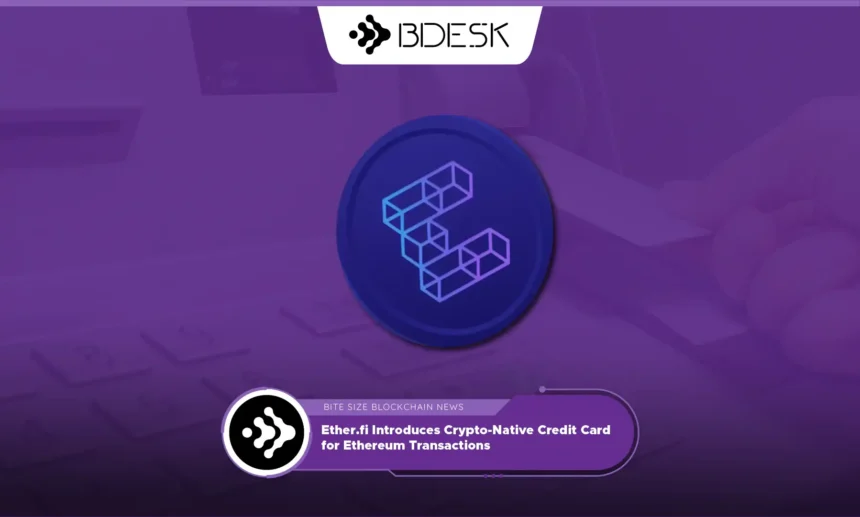Summary:
- Ether.fi Launches Crypto-Native Credit Card: Ether.fi Cash, a Visa credit card that settles transactions on Scroll, Ethereum’s layer-2 scaling network, lets users pay with crypto wherever Visa is accepted.
- Non-Custodial and Yield-Bearing Features: The card allows users to keep their crypto in their wallets and borrow against assets like Ether.fi’s liquid restaking tokens (LRT), with the option to repay balances using native crypto yields.
- Growing Crypto Payment Card Market: With a projected market value of $152 billion by 2030, crypto-native credit cards like Ether.fi’s are becoming popular, although DeFi-based credit card offerings remain rare.
Ether.fi Launches ‘Crypto-Native’ Credit Card: Ethereum Payments Now More Accessible
The Ethereum ecosystem continues to evolve, pushing the boundaries of decentralized finance (DeFi) functionality with innovative solutions. The latest breakthrough comes from Ether.fi, a liquid restaking protocol that is launching a crypto-native credit card called Ether.fi Cash, aimed at bringing cryptocurrency payments to the mainstream. This card is built on Scroll, an Ethereum layer-2 scaling solution, and will allow users to pay with crypto wherever Visa is accepted, according to a Sept. 9 post on the X platform.
With the growing demand for more practical uses of cryptocurrency, Ether.fi’s new Visa card bridges the gap between digital assets and traditional finance, offering holders the ability to leverage their crypto for everyday purchases. But what makes this offering unique in an increasingly crowded crypto card market?
Ether.fi Cash: The New Crypto-Native Credit Card
The Ether.fi Cash card stands out due to its non-custodial nature, meaning that users don’t have to transfer their crypto to a third-party account to use it for payments. Instead, the crypto stays safely in the user’s wallet, while the card allows for easy payments using their digital assets. The card comes in branded tiers such as Pepe, Wojak, Chad, and Whale, creating a distinctive identity for each tier based on popular internet culture, according to the company’s website.
In a notable feature, cardholders can borrow against their crypto collateral, including Ether.fi’s liquid restaking token (eETH) and yield-bearing assets, to finance purchases. Essentially, users can hold onto their crypto while still leveraging its value for real-world transactions. As Ether.fi expands its functionalities, soon users will be able to repay their card balances using native crypto yields, making the card a versatile tool for crypto holders looking to maximize their asset utility.
Decentralized Finance Meets Credit Cards: What Sets Ether.fi Apart?
Crypto payment cards have been gaining traction, particularly those offered by major crypto exchanges like Coinbase, Crypto.com, and Gemini, along with wallet providers like Gnosis. These cards typically function by converting cryptocurrencies, such as USD Coin (USDC), into fiat currencies instantly, facilitating seamless transactions with merchants worldwide. However, cards purveyed by DeFi protocols are still relatively rare in the broader $97 billion crypto credit card market, which is projected to grow to $152 billion by 2030, according to Verified Market Research.
Ether.fi’s unique positioning lies in its fusion of DeFi functionality with a traditional credit card model. By allowing users to leverage their crypto collateral for borrowing, Ether.fi Cash provides additional flexibility compared to standard crypto cards. This innovation could appeal particularly to DeFi enthusiasts looking to hold onto their crypto for long-term growth while still accessing the liquidity needed for everyday purchases.
Ether.fi and the Rise of Liquid Restaking
Ether.fi is no stranger to innovation within the Ethereum space. Launched in 2023, the protocol allows users to contribute Ether (ETH) and its liquid staking derivatives, such as Lido Staked Ether (stETH), into restaking pools. In return, they receive Liquid Restaking Tokens (LRTs), which can be traded or leveraged for various DeFi activities. As of 2024, the protocol has accumulated over $5.5 billion in total value locked (TVL), according to DefiLlama.
By integrating this liquid restaking feature into its credit card offering, Ether.fi allows users to unlock new financial possibilities, effectively combining the worlds of staking, borrowing, and spending in one streamlined package. Users not only benefit from the potential appreciation of their staked assets but also have the option to utilize them for real-world transactions without selling off their crypto holdings.
Where Can You Make Payments with Crypto?
With the launch of Ether.fi Cash, crypto holders now have even more options for making payments with their digital assets. As Ether.fi Cash is backed by Visa, it can be used anywhere Visa is accepted, opening up countless opportunities for crypto payments in both physical and online stores worldwide.
Aside from Ether.fi, major players in the crypto space, such as Coinbase, Crypto.com, and Gemini, offer similar crypto-friendly payment cards. These cards typically convert cryptocurrency into fiat in real time, enabling users to make payments seamlessly without worrying about merchants accepting crypto directly. However, Ether.fi Cash’s DeFi-focused features and non-custodial structure set it apart from these more traditional offerings.
The Future of Crypto Payments
As more companies introduce crypto-friendly payment solutions, the future of digital assets in everyday transactions looks bright. The crypto credit card market is expanding rapidly, driven by innovations like Ether.fi Cash that provide greater utility for crypto holders. By offering a solution that allows users to keep their crypto while borrowing against it and using it for real-world purchases, Ether.fi is tapping into a growing demand for financial flexibility in the DeFi space.
The introduction of Ether.fi Cash underscores a broader trend: cryptocurrency is increasingly becoming a viable medium of exchange in day-to-day transactions. With the continued growth of Ethereum-based solutions and DeFi platforms, users can expect more convenient and secure ways to leverage their digital assets in the real world.
Disclaimer:
The information provided on 13Desk is for informational purposes only and should not be considered financial advice. We strongly recommend conducting your own research and consulting with a qualified financial advisor before making any investment decisions. Investing in cryptocurrencies carries risks, and you should only invest what you can afford to lose. 13Desk is not responsible for any financial losses incurred from your investment activities.











